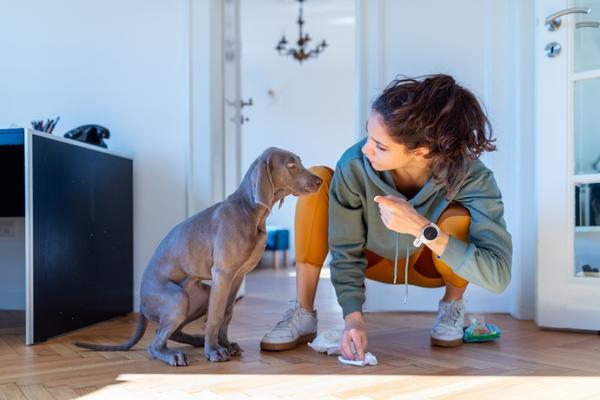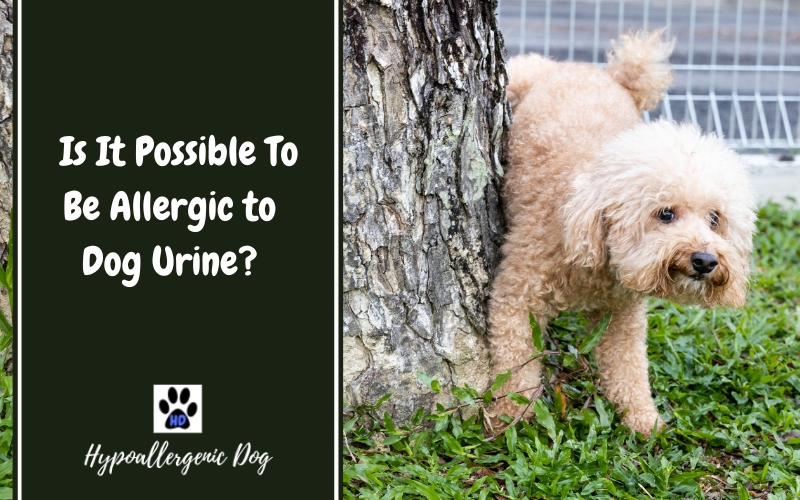Can You Be Allergic to Dog Urine?
Are you allergic to dog urine? Many people assume that dog allergies are caused by a canine’s hair, but this isn’t the case. Dogs carry allergens in their dead skin cells, saliva, and even their urine! That’s right, it might be your dog’s pee-pee causing your throat to itch and your eyes to stream.
Can dog pee cause dog allergies? Yes, it can, but there are allergens all over your pooch, not just in their urine. Allow us to explain….
Is It Possible To Be Allergic to Dog Urine? Contents
Causes of Dog Allergies
Types of Allergens
Can You Be Allergic To Dog Urine?
Allergic to Dog Urine Symptoms
How Can I Stop Being Allergic to My Dog?
Conclusion
Allergic To Dog Pee FAQs
Causes of Dog Allergies
To understand why shedding influences a dog’s ‘allergy-friendly’ status, you’ll need to know what causes dog allergies.
Allergic reactions to dogs are triggered by a range of situations, such as:
- By petting your dog.
- Touching a surface where allergens have settled.
- Breathing in microscopic allergens.

Types of Allergens
Currently, seven canine allergens are documented. The most prolific responsible for causing dog allergies are two proteins, Canis Familiaris Allergen 1 and Canis Familiaris Allergen 2 — Can F1 and Can F2 for short. These are found in a dog’s:
- Saliva/drool.
- Dead skin cells (dander).
However, if you’re allergic to dog urine, it’s the Can F5 protein that’s to blame.
Urine and Saliva
Avoiding saliva and urine allergens isn’t as easy as it first seems. You may think that if you don’t come into contact with your dog’s urine or drool, you’ll be fine, but these proteins can settle around your home and cause problems for you later on.
For example, a drooly Basset Hound may not get saliva directly on your hands. But, you might touch the blanket they dribbled on earlier. The same goes for urine, your pooch may have pee-pee on their paws and then sits next to you on the couch. If you touch the contaminated surface, there is a risk of an allergic reaction.
Dander
Many people believe allergies are caused by a dog’s fur, but dead skin cells attached to the hair are the true culprits. When your dog sheds their coat, dander is released with the fur. Therefore, the more your dog sheds, the more dead skin cells you’re exposed to.
Bear in mind, these tiny allergens can float around in the air — you may not have to touch anything for a reaction to occur. If you have a dog allergy, spending time in the same room as a bow-wow may be all it takes to trigger your symptoms.
Can You Be Allergic To Dog Urine?
Research indicates approximately 10 to 20% of people suffer from a dog allergy.
Yet, not all people are allergic to dog pee, dander, and saliva. In certain cases, only one of these triggers the symptoms.
Experts indicate the Can F5 protein is present in unneutered males. The allergen is produced in the dog’s prostate and released when they urinate. If your allergy symptoms are worse around male dogs than females, you may be sensitive to the allergens in their pee.
Allergen Testing
A certified allergist will be able to perform a test to find out what allergen is triggering your symptoms. However, a standard skin prick test may not provide conclusive results.
As all allergens can be airborne and remain in the atmosphere long after a dog has gone, it can be challenging to work out which allergen is your kryptonite — dander, saliva, or urine. However, it wouldn’t be wise to touch dog pee one day, drool the next, and finally, some dander-covered fur to work out what’s causing your allergies.
If you have a severe allergy, the solution is to limit the time you’re around dogs and keep potential allergen exposure to a minimum.

Allergic to Dog Urine Symptoms
Having allergies isn’t a nice experience, especially if you’re a dog lover who’s allergic to dogs! Before you put all your dreams of having a furry friend on hold, it’s worth checking if your symptoms are, in fact, symptoms of a dog allergy.
Common dog urine allergy symptoms include:
- Itchy eyes.
- Sneezing.
- Watery and red eyes.
- Congestion.
- Itchy nose.
- Itchy throat.
- Itchy roof of mouth.
- Coughing.
- Postnasal drip.
- Face pain.
- Trouble sleeping.
- Blue-tinged skin under eyes.
As well as struggling with the above symptoms, people with allergic dermatitis may experience several skin problems, including:
- Eczema.
- Hives.
- Itchy skin.
For people with asthma, a dog allergy can be more serious and may cause more severe symptoms. If you have a dog allergy and asthma, your symptoms may include:
- Chest pain.
- Trouble breathing.
- Wheezing.
- Tight chest.
- Shortness of breath.
- Difficulty sleeping.
Several of the above symptoms are similar to hay fever and allergic reactions caused by many other allergens. Hence, a professional allergy test is advisable to rule out or confirm whether your canine is responsible.
How Can I Stop Being Allergic to My Dog?
Whether you’re allergic to dog pee, dander, saliva, or all three, you may be wondering if there is a way to stop your allergies. While you can’t cure yourself, there are steps you can take to reduce your symptoms and limit your exposure to allergens.
Create ‘No Dogs Allowed’ Areas
Dog allergens can settle on carpets, furniture, curtains, rugs — basically everywhere. If you let your dog into every room of your house, sleep on your bed and cuddle on the couch, there will be allergy-inducing proteins all over your house.
To keep your symptoms under control, set some strict doggy rules and implement some ‘no-go zones’ for your pooch.
Replace Your Carpets
Many people love the cozy feel of carpets, but they harbor allergens and can be difficult to clean. While it may appear drastic, replacing them with wooden floors, lino or tiles can help to solve this problem straight off.
Clean Regularly
As dog allergens can settle on all surfaces in your home, a regular cleaning routine is important and minimizes prolonged exposure. Clean your dog’s bed regularly, but also remember to dust hard surfaces, vacuum the carpets and wash your bedding frequently. This will prevent the spread of urine around your home as well as dog hair and dander.
Wash your clothes after spending time with your pooch. Changing your clothes after walkies or playtime is a smart way to keep your own body free from allergens.
Immunotherapy
Allergy shots are available to help reduce the severity of allergy symptoms. Immunotherapy is where a small amount of allergen is injected under the skin, and over time, the amount is increased. Allergy shots desensitize the immune system, and while they can’t eliminate the allergy entirely, they’re effective at curbing symptoms.
Don’t Use a Puppy Potty
If dog urine is triggering your allergies, keeping a dog toilet or puppy potty in your house isn’t a wise idea. Artificial grass toilets for dogs are a popular choice for apartment dwellers and also mean dogs can be left indoors for several hours, without needing a bathroom break.
However, if you have an allergic reaction to dog urine, these doggy toilets can make matters worse. Try your best to train your dog from a young age to do their business outside. The fewer urine allergens inside your house, the better!
Brush Your Dog Outside
Allergens are released whenever you brush your dog’s coat. To stop it from settling inside your home, brush your dog outside. If your symptoms are severe, give this grooming responsibility to someone else.
When brushed outside, the allergens will float into the fresh air, instead of remaining trapped and circulating around your house.
Limit Your Time Spent With Dogs
This one can be tricky if you have a pet pooch, but the best way to keep allergies under control is to limit your contact. For example, if your friend has a dog, suggest meeting at your house instead of theirs.
Dog allergens are everywhere, and it may be difficult to completely eradicate all risks. However, avoiding dogs as much as possible lowers the chances of triggering an allergic reaction.
Use an Air Purifier
Evidence shows that using an air purifier reduces dog allergy symptoms. This device with a pet-specific (HEPA) filter can remove allergens from the air in your home. The filter traps dog hair and dander, keeping you breathing easy and reducing the risk of a more severe allergic reaction. As proteins from a dog’s urine can contaminate dander it will help to eliminate these too.
Choose a Hypoallergenic Dog
There is no such thing as a completely allergy-free dog, but there are breeds that can live happily alongside people with allergies. Hypoallergenic dogs are those that are low to non-shedding and don’t drool much. And, if you’re allergic to dog urine, gender will also be important — choose either a female or a neutered male — remember it’s the prostate that produces the allergen.
There are hundreds of hypoallergenic dog breeds and they come in all different shapes, sizes, and personalities. If you’re not sure what canines are allergy-friendly, why not take a look through our hypoallergenic dog breeds profiles.
As you can see, there are many steps you can take to reduce your exposure to dog allergens and minimize all of those pesky symptoms. A dog urine allergy doesn’t mean you can’t live harmoniously with your dog, but it does mean you need to put in some effort to help keep your condition under control.

Conclusion
If you’re allergic to dog urine, you may also be sensitive to dander and saliva. And, if you don’t want your allergies to hamper you from becoming a pet parent, a hypoallergenic dog is your best bet.
A dog urine allergy can cause respiratory and skin problems, as well as several other common allergy symptoms — like coughing, sneezing, and watery eyes. So if you think you’re allergic to dog urine follow our tips and fingers crossed, your symptoms will improve.
Allergic To Dog Pee FAQs
Can Humans Get Sick From Dog Urine?
Dogs can transmit zoonotic diseases to humans, and bacteria and viruses can be spread via their urine. If a human comes into contact with infected urine or other bodily fluids, they can become sick. Leptospira is one of the many diseases that can be transmitted through dog urine.
How Long Do Pet Allergy Symptoms Last After Exposure?
Pet allergy symptoms can last up to several weeks, depending on the severity of your sensitivity. However, in most cases, symptoms will cease after just a few hours, and more serious reactions may last for around two or 3 days.
Does Vinegar Clean Dog Urine?
If your dog has urinated in your house, a homemade cleaning solution of white vinegar and water may be all that’s needed to clean it up. The acidity of vinegar means it can quickly and effectively neutralize the smells and bacteria in the urine.
How Do You Tell if a Human Is Allergic to Dogs?
Diagnosing a dog allergy can only officially be done by a doctor performing a skin prick allergy test. However, if you experience coughing, sneezing, watery eyes, and an itchy throat when in the company of dogs, these could be symptoms of a dog allergy.
What Parts of Dogs Are Humans Allergic To?
Contrary to popular belief, humans are not allergic to dog hair. The dog allergens that trigger an allergic reaction are found in a canine’s saliva, urine, and dead skin cells.
Can You Build up an Immunity to Dog Allergies?
Through the use of immunotherapy, you could build up a tolerance to the allergens in your home.
Why Am I Suddenly Allergic to My Dog?
Unfortunately, you can develop allergies at any time in your life, even to things that you were once not allergic to, such as your dog. This can come down to the way your immune system is aging and reacting to certain allergens.


